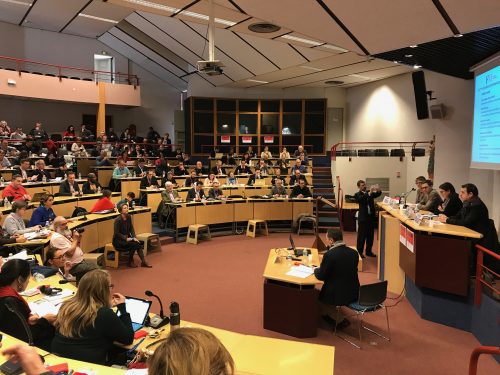The term “fake news” continues to receive a great deal of attention. Even Pope Francis fell victim to the phenomenon a few years back when some Facebook headlines claimed he endorsed Donald Trump for president. He didn’t, of course, because popes don’t endorse political candidates. Thankfully, many Catholic and mainstream media clarified the erroneous report.
In many ways, the attempt to use media to peddle falsehoods and disinformation isn’t anything new. It’s always been a favorite tool of dictators and propagandists. But the potential reach and impact of fake news has grown because of the pervasiveness of social media and because a large segment of the public seemingly lacks the media literacy skills to know the difference between fake news and accurate, well-sourced reporting.
Ultimately, fake news erodes trust in reputable journalism and the free press. It’s bad for society and the church — even dangerous. Pope Francis recognizes this, and that’s why he focused his 2018 World Communications Day message on the theme, “‘The truth will set you free’ (John 8:32): Fake news and journalism for peace.”
The purveyors of fake news use “snake tactics” to perpetuate untruths and dishonesty, just as the devil in the Book of Genesis did with Adam and Eve, the pope said. The only defense is truth. This includes freedom from falsehoods, but it also means communication that encourages listening and dialoguing with others. It means fostering community and promoting responsibility and goodness for the benefit of the common good.
Journalists, Pope Francis said, are the “protectors of news.” Our work isn’t just a job, it’s a mission — one that puts the dignity of the human person at the center of everything we do. Good journalists, including good Catholic journalists, must ensure the accuracy of sources, build trust and serve all people, especially the poor, the vulnerable and those who otherwise would have no voice. A “journalism for peace” is one committed to hope, mercy and dialogue, eschewing “shouting matches and verbal violence.”

The pope’s message dovetailed with the theme of the International St. Francis de Sales Days conference in Lourdes, France, a gathering I recently attended in my role as president of the Catholic Press Association of the United States and Canada.
The three-day meeting began Jan. 24 — the day Pope Francis released his Communications Day message and the feast day of St. Francis de Sales, patron of journalists. The conference focused on the “Media and Truth” and included representatives from 26 countries. It was sponsored by France’s Federation of Catholic Media and the Vatican’s Secretariat for Communication.
Panel presenters addressed the topic of truth from various philosophical, theological and journalistic perspectives. Speakers included Msgr. Dario Edoardo Vigano, head of the Vatican communication secretariat; Natasa Govekar, director of the secretariat’s theological-pastoral department and keynoter for this year’s Catholic Media Conference in Green Bay; and Helen Osman, president of SIGNIS, the World Catholic Association for Communications.
During her panel presentation, Osman addressed the importance of training and hiring good local journalists — those who listen, as Pope Francis asks, to the needs and hopes of the people on the street and in the pews. This is what builds trust between journalists and the public, making people less vulnerable to the purveyors of fake news.
Also during the conference, Cardinal Pietro Parolin, the Vatican secretary of state, presented the Father Jacques Hamel Prize to honor the legacy of the late French priest who was killed during a Mass in 2016 by two men claiming allegiance to the Islamic State. The winner was a French reporter who published a story about how two brothers — one Catholic, one a convert to Islam — and their families have worked to navigate their religious differences, especially after the Paris terrorist attacks in November 2015.
The story didn’t gloss over hard realities. But it exemplified the positive impact a story has when it’s based in truth, a sense of hope and a commitment to shedding light on important issues instead of only stoking fires, which seems to be the focus of so much 24/7 reporting today.
The International St. Francis de Sales Days were a powerful reminder of the responsibility we are given in our work here at The Visitor. It re-emphasized for me the importance — no matter what part of the world we are from — of supporting fellow Catholic communicators in our mission of searching for and communicating the truth, which is ultimately rooted in the Good News of Jesus Christ. There are too many misleading and unhealthy messages competing for people’s attention for us not to be learning from one another and working together whenever possible.
This month, which is Catholic Press Month, is a good time to reflect on Pope’s Francis’ Communications Day message and its importance for Catholic journalists around the world as they strive to report the truth and combat fake news in all of its forms.
Communications Day prayer
Pope Francis included the following prayer at the end of his 2018 World Communications Day message:
Lord, make us instruments of your peace.
Help us to recognize the evil latent in a communication that does not build communion.
Help us to remove the venom from our judgments.
Help us to speak about others as our brothers and sisters.
You are faithful and trustworthy; may our words be seeds of goodness for the world:
where there is shouting, let us practice listening;
where there is confusion, let us inspire harmony;
where there is ambiguity, let us bring clarity;
where there is exclusion, let us offer solidarity;
where there is sensationalism, let us use sobriety;
where there is superficiality, let us raise real questions;
where there is prejudice, let us awaken trust;
where there is hostility, let us bring respect;
where there is falsehood, let us bring truth.
Amen.






















